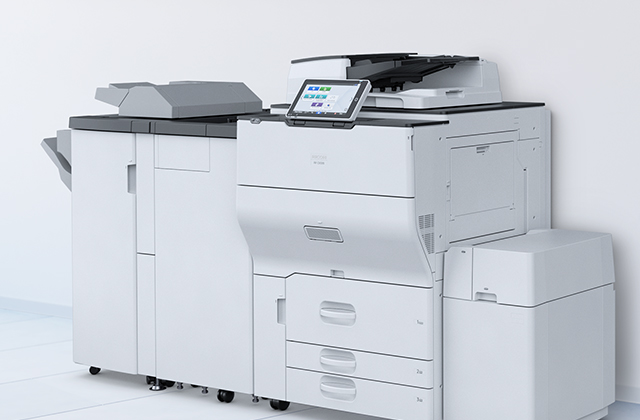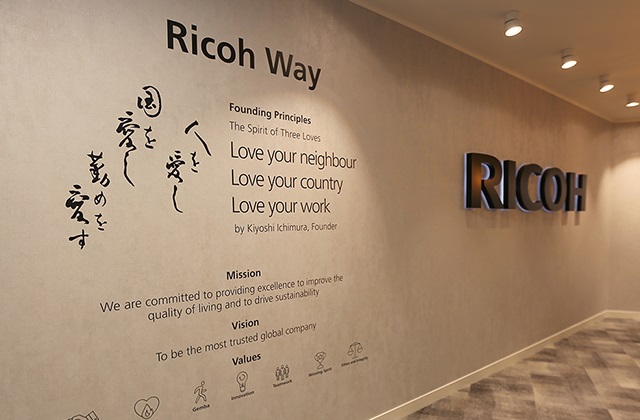Generation Z: helping SME’s prepare for globalisation
By David Mills, CEO, Ricoh Europe
Ricoh Europe, London, 19 October 2015 – By 2020, it is estimated that the number of people in the global middle class1 will amount to 3.2 billion (up from 1.8 billion in 2009)2. This will have a monumental impact on how businesses operate. With global trade increasing at twice the rate of global GDP since 19803, businesses can no longer afford to ignore the global market.
There are three key areas where globalisation will affect businesses. Firstly, businesses will have to contend with the rise of the global consumer, with far reaching expectations and highly local requirements. Secondly, collaborative working (and the technologies that enable it) will shape the global marketplace of ideas and innovation. Lastly, the impact of business competition on a global scale will challenge and change the convention of leadership, both within inpidual enterprises and across whole industries. Fortunately for SME’s, smaller businesses are typically better placed to take advantage of these challenges than larger, less agile corporations. Importantly, the latest generation to enter the workforce, Gen Z, are better prepared than any before them to embrace the new technologies and ways of working that globalisation requires.
The rise of the global middle classes poses a huge opportunity for international business. But as marketplaces expand across borders and continents they become more perse. While enterprises may offer their products and services globally, consumers still expect any interaction with a company to have a local, relevant and personal feel. Smaller, niche enterprises with an intense understanding of specific regions, markets and customers will prevail in these varied markets. For example, Oliver Samwer’s ‘start-up studio’, Rocket Internet, works with 33,000 employees across 30 companies in 110 countries, lending their expertise and financial backing to specialist companies that have an intense understanding of their specific markets.
The ability to break into developing markets often hinges on addressing or overcoming the social problems that have inhibited the local commercial landscape. As consumers recognise that they have the choice of a global marketplace of services, companies will have to work harder to differentiate themselves in specific markets. A foreign company is far more likely to gain the trust and custom of local consumers if they actively engage in Corporate Social Responsibility activity. Of course, the commitment must be genuine and for the long-term. Here, Generation Z workers become a natural fit for a perse, globally-minded business because concern for the societal impact of their job is a major factor in their career choice. New research sponsored by Ricoh Europe reveals that more than twice as many Gen Zers are attracted to a company that enables them to feel like they’re making a difference to the world – 34 per cent compared with 13 per cent of Baby Boomers, 14 per cent of Gen X and 15 per cent of Millennials4.
With the development of global economies and global marketplaces it’s natural that companies must tap into a global network of ideas. Successful, global companies must ensure they are using locally developed ideas as part of their global strategy. As a result, innovation and corporate agility are vital. Collaboration, both intercontinental and interdepartmental, is an integral part of an expanding global business. Ideas will come from many different parts of companies and new technologies must be embraced for these to catalyse into business development. It’s here that Gen Z are better prepared for the inevitable changes that will reshape the workplace. Having grown up with constant access to the internet, these digital natives are naturals when it comes to working with new technologies. Almost three times as many Gen Z respondents are attracted to companies that offer technology to enable people to work more efficiently (28 per cent) than those from the older generations (10 per cent)5. And crucially, preference for face-to-face communications drops from 77 per cent among Baby Boomers to 58 per cent among Generation Z6.
Digital and collaborative ways of working will become the norm for the globalised business. While Gen Z are perfectly poised to take advantage of these changes, SMEs also have a natural advantage when it comes to the process of digitisation that globalisation necessitates. We’ve seen that 79 per cent of small business leaders believe their company has an advantage over enterprises because they can optimise processes more quickly7. Delving deeper into this collective confidence, 70 per cent of small financial services business leaders feel they are able to understand, deploy and benefit from new technology quicker than larger competitors. The reduced size of SMEs also means the cost, and subsequent risk, of embracing new technologies is diminished allowing these companies to take rapid advantage of digitisation.
As businesses spread on a global scale, a flatter approach to organisational structure is required. Centrally located c-suites will find it impossible to effectively manage a widespread, global business where local autonomy and expertise are required for operational success. Looser management structures enable businesses to be more dynamic and relevant at the local level. Again, Generation Z’s workplace expectations align well with this development in global business. Salary aside, the principal career attractions for younger workers are a defined work-life balance (48 per cent) and flexible working hours (42 per cent)88. This style of working suggests a detachment from traditional managerial structures and greater independence for inpidual workers.
The next wave of globalisation will present significant challenges to modern businesses but the opportunities and advantages of overcoming these obstacles are equally substantial. These benefits include the sales advantages of access to a global customer base, the cost savings achieved through the implementation of global corporate communications and the innovation gains that such streamlined collaboration would generate. The flexibility and agility of small businesses grants them a natural head-start in the global marketplace, combined with the widening and flattening of traditional industries on a global scale. Similarly, Generation Z workers will find themselves better placed to adopt global working practices and mind-sets than any preceding generation. If SME’s can recognise and anticipate these advantages in their own business and effectively harness the attitudes and skills of incoming Generation Z workers then they are poised to reap the benefits of a developing global market.
- http://www2.deloitte.com/content/dam/Deloitte/uk/Documents/about-deloitte/deloitte-uk-about-india-matters.pdf
- https://www.wto.org/english/res_e/booksp_e/world_trade_report13_e.pdf
- http://dupress.com/articles/bus-trends-2014-introduction/
- http://www.ricoh-europe.com/about-ricoh/news/2015/generation-z-is-the-most-challenging.aspx
- http://www.ricoh-europe.com/about-ricoh/news/2015/generation-z-is-the-most-challenging.aspx
- http://www.ricoh-europe.com/about-ricoh/news/2015/collision-or-collaboration-as-gen-z-joins-workforce.aspx
- http://www.ricoh-europe.com/about-ricoh/news/2014/financial-services-see-greatest-business-benefit-in-digital-maturity.aspx
- http://www.ricoh-europe.com/about-ricoh/news/2015/generation-z-is-the-most-challenging.aspx
| About Ricoh |
Ricoh is empowering digital workplaces using innovative technologies and services that enable individuals to work smarter from anywhere.
With cultivated knowledge and organizational capabilities nurtured over its 85-year history, Ricoh is a leading provider of digital services, information management, and print and imaging solutions designed to support digital transformation and optimize business performance.
Headquartered in Tokyo, Ricoh Group has major operations throughout the world and its products and services now reach customers in approximately 200 countries and regions. In the financial year ended March 2022, Ricoh Group had worldwide sales of 1,758 billion yen (approx. 14.5 billion USD).
For further information, please visit www.ricoh-europe.com
© 2023 RICOH COMPANY, LTD. All rights reserved. All referenced product names are the trademarks of their respective companies.
For further information, please contact:
Ricoh Europe PLC
Charlotte Fernandez
E-mail: media@ricoh-europe.com
Homepage: www.ricoh-europe.com
Join us on Facebook: www.facebook.com/ricoheurope
Follow us on Twitter: www.twitter.com/ricoheurope
Follow us on LinkedIn: http://linkedin.com/company/ricoh-europe
Visit the Ricoh media centre at: www.ricoh-europe.com/press














